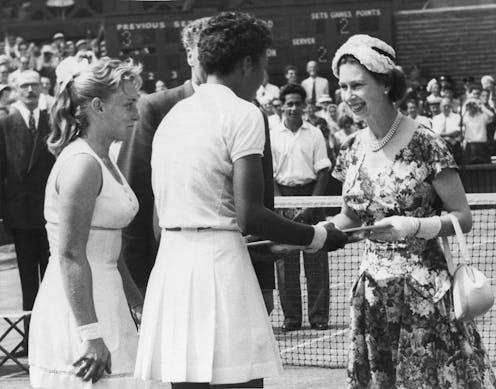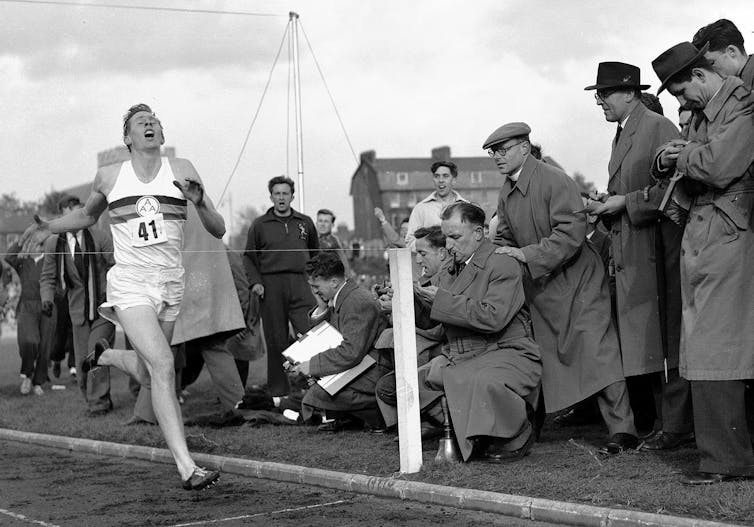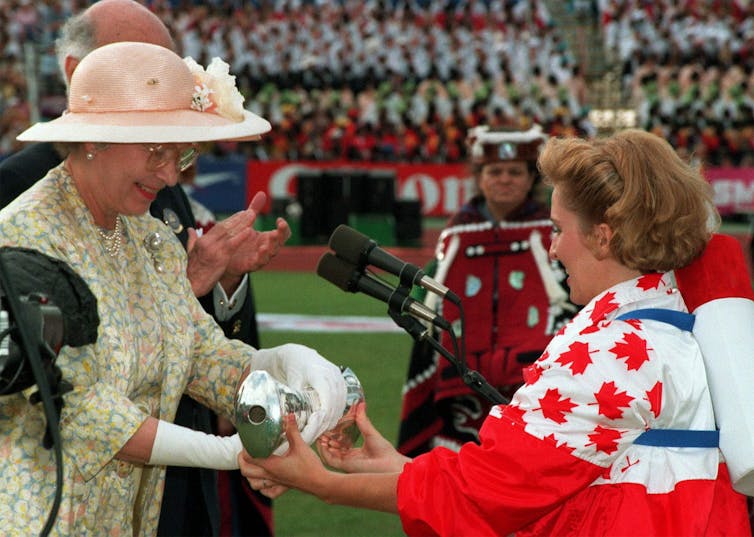
The United Kingdom is celebrating Queen Elizabeth’s 70 years as head of the Commonwealth.
As many know (possibly through Netflix’s biopic The Crown) the Queen ascended the throne in 1952 following the sudden death of her father King George VI.
Over seven decades, her family members have regularly presented themselves as avid (upper-class) sportspersons, but also as distinguished patrons at more popular (working-class) sporting events. Sport, in short, has been a significant feature of her reign.
Social and political conditions of the early 1950s propelled a core feature of contemporary sport: the quest to push the limits of human possibility. In an upcoming BBC Sportshour segment, sports journalist Caroline Barker, sports historian Jean Williams and I discuss the relationship between the Queen and sport — as well as how 21st-century sport found its roots during the early days of Queen Elizabeth’s reign.
No longer a fading empire
Athletically, two of the most important moments in human barrier-breaking happened at the start of Queen Elizabeth’s reign.
On the day of the Queen’s coronation, news reached the British Isles that New Zealander Sir Edmund Hillary and Nepalese Sherpa Tenzing Norgay summited Mount Everest for the first time on behalf of her Empire. And less than one year later, Roger Bannister broke the mythical four-minute mile barrier on a track in Oxford.
These demonstrations of ultimate human physical achievements set in motion the drive for incremental or marginal gains that currently dominate sport sciences and athletic preparations.
Both events were touted not only as incredible feats demonstrating the capacities of human physical potential, but as symbols that the United Kingdom was no longer a fading and diminished Empire following the devastation of the Second World War.

While the idea of nations like the United States and the U.K. asserting themselves through athletic exploits wasn’t new, Britain’s key role in globalization, and the rise of nationalism in a post-Second World War geopolitical landscape, combined with the explosion of television viewership strategically used by both the Queen and sport meant international sporting success became increasingly significant.
Sport as a tool for identity
Into this expanding sport world stepped the Soviet Union. In 1952, just months into the Queen’s reign, the Soviet Union participated in the Olympic Games and immediately challenged the powerful Americans’ international sport dominance.
This led to years of Cold War sporting combat when international competitions — including the Olympics and events like the Canada-Soviet ice hockey Summit Series in 1972 — served as spaces for marginal gains as countries weaponized athletes as pseudo-agents of their nations.
The use of sport as a tool for national identity and political battle has been magnified over the past 70 years.
Sport as a tool for social justice
Combining the athletic push for boundary breaking, the intersection of sport and politics, another feature of contemporary sport formulated in the earliest days of Queen Elizabeth’s reign: the use of sport as a tool for social justice.
Most famously, five years before the Queen’s ascension, Jackie Robinson broke the Major League Baseball colour barrier.
Over the Queen’s first years on the throne, sport integration continued to expand, and by 1957 a retired Robinson used his sport platform to stand side-by-side with Martin Luther King Jr. as a prominent leader of the Civil Rights Movement. Soon athletes like Muhammad Ali and Billie Jean King fought against racial and gender inequality in and through sport.
Over the course of the Queen’s 70-year reign, sport has transformed into a highly technological, politicized, pervasive and commercialized entity. In many ways sport today is unrecognizable from what it was like in 1952.

Current issues that dominate sport discourse include balancing limits on technological interventions in sport, sportswashing strategies employed by countries with questionable human rights records, the international sporting arms race, athletes as political influencers and how to determine eligibility for athletes like Caster Semenya.
These contemporary sporting issues developed incrementally over the past 70 years. And like sport, the Queen’s role in 2022 generates significant critical debate — particularly in terms of the monarchy’s appropriate and functional place in society as well as the misuse and unequal distribution of resources.
But on the occasion of her Platinum Jubilee, it serves as a useful opportunity to reflect on the complex interactions and historical evolution of not just the British monarchy, but the transformations (for better or worse) in sport, politics and society during her reign.
Tim Elcombe does not work for, consult, own shares in or receive funding from any company or organisation that would benefit from this article, and has disclosed no relevant affiliations beyond their academic appointment.
This article was originally published on The Conversation. Read the original article.







